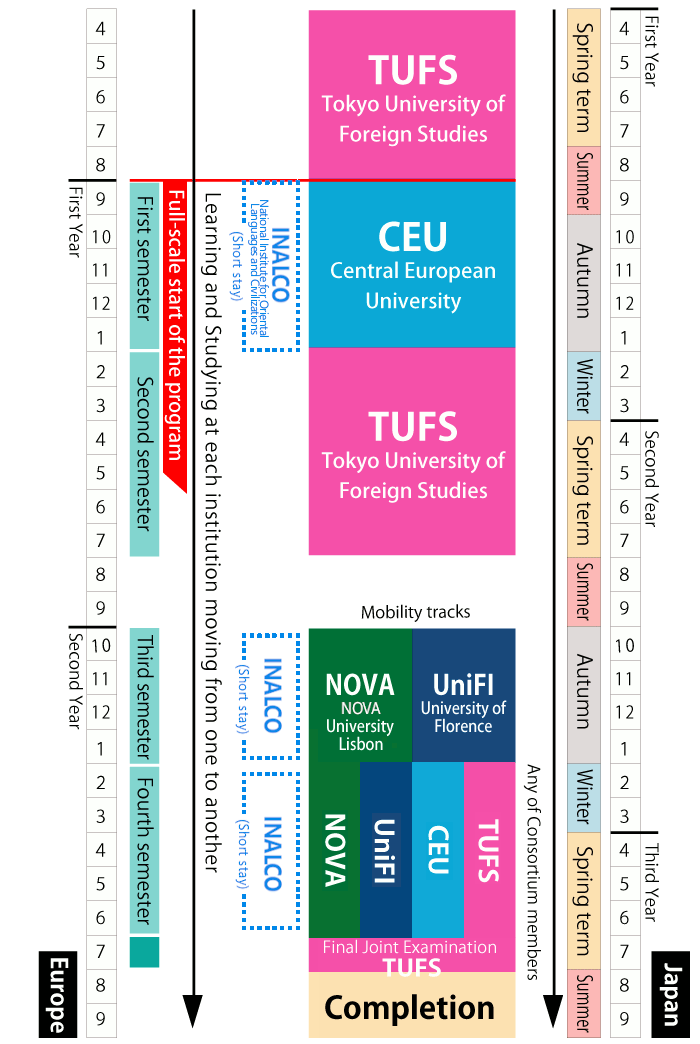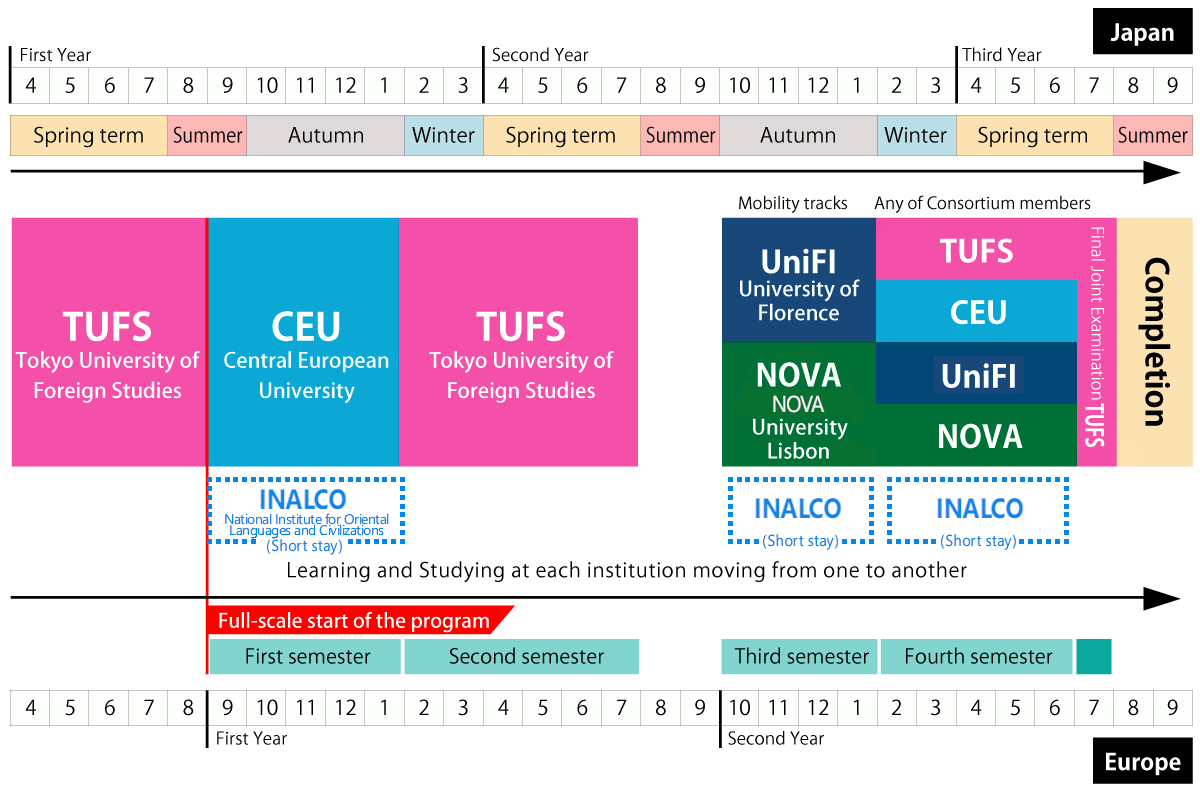PROGRAM
NEW HP from March 2025 ⇒ HIPS | 大学院総合国際学研究科 | 学部・大学院/教育 | 東京外国語大学
Basic Information (Term, Institution, Degree, Language)
| Term | Two years and six months *1 | |
|---|---|---|
| Institution | Master’s degree students of the Graduate School of Tokyo University of Foreign Studies | |
| Academic degree | Tokyo University of Foreign Studies (TUFS, Japan) Central European University (CEU, Hungary/Austria) University of Florence (UniFI, Italy)NOVA University Lisbon (Nova, Portugal) | Consortium partner institutions |
| National Institute of Oriental Language and Civilizations (INALCO, France) | Associated partner | |
| Academic degree | Master of Arts (Humanities) [Tokyo University of Foreign Studies] Master of Arts in History [Central European University] | |
| Language | English (and the language of each institution) | |
*1 the actual program period is two years starting from October in the first academic year
Four themes
The program is built around four themes for learning and studying based on “History of the public sphere”History and institutionalization of memory
A focus on the mechanism by which memories in the past are institutionalized as public ones through an interdisciplinary approach, with the purpose of training human resources to understand the dynamism of conflicting memories and history.Visual representations and medialization of history
In modern society, historical images are produced through visual representations and media, and have a great influence on public memory. Students learn frameworks in which history is generated by medialization, and attend practical workshops.Histories of inclusion and exclusion
History and collective memories have caused inclusion and exclusion in real societies. The program considers ways to ensure that the “History in the public sphere” does not reach a critical level of conflict.Entanglement between national, regional, and global frameworks of history
In order to conduct research extending over Japan and Europe, the program aims to provide a transnational comparative study of each of the three themes across regions, nations, and civilizations at the final research stage.Three components
The program has three components, each of which is conducted at a participating institution according to the semester schedule.Coursework
The coursework consists of mandatory core courses, mandatory elective courses, and elective courses.- CEU: https://hipsma.com/program/#courses
- TUFS: http://www.tufs.ac.jp/hips/en/courses/
- UniFi/NOVA: https://hipsma.com/program/#courses (Please refer to “Prospective courses”.)
Practical experience and skills
Workshops or study visits (first year) Internship (second period) Practical learning of various skills related to history and the public sphereResearch and research training
Preparation for the Thesis/Capstone Projects and their completionYear and Semester Schedule
During the two-and-half-year program, students study every semester (about six months) at one of the partner institutions in the consortium that includes the Tokyo University of Foreign Studies (TUFS), the Central European University (CEU, Hungary/Austria), the University of Florence (UniFI, Italy), NOVA University Lisbon (Nova, Portugal) , and the associated partner institution, The National Institute of Languages and Civilizations (INALCO, France), following mobility tracks in the third and fourth semesters. At each institution, students complete coursework and practical experience and skills, including internships, and prepare their thesis/capstone project in accordance with the curriculum and schedule.
Program Schedule


Curriculum and Courses
HIPS program requirements (in ECTS, as of 15 February 2020)| Year 1 Joint recruitment, admission, and enrollment | ||
| ECTS | Central European University (first semester) | Tokyo University of Foreign Studies (second semester) |
| Thematic and methodologic orientation | Building a transnational context | |
| 16 | Core courses | |
| “Introduction to the Study of History in the Public Sphere” (8 ECTS) | “Comparative Memory Politics” (4 ECTS) “Japanese History in Transnational and Comparative Perspective” (4 ECTS) | |
| 16 | Thematic mandatory electives | |
| “History and Institutionalization of Memory” (“Memory”) “Visual Representation and Medialization of History” (“Visual representation and media”) “Histories of Inclusions and Exclusion” (“Inclusion and exclusion”) “Entanglements between national, regional, and global frameworks of history” (“Entanglements”)Each student chooses two out of four offered at both institutions (4 ECTS each) | ||
| 14 | Elective courses | |
| Including optional source language (for max. 4 ECTS) and elective courses offered by other departments (for max. 8 ECTS) | ||
| 10 | Practical experience and skills | |
| Study visits; practitioners’ workshops; audio-visual skill building | ||
| 4 | Research and research training | |
| Prospectus writing workshop (CEU) and participation at student conference (TUFS) | ||
| Year 2 Students follow their chosen thematic track for third and fourth semesters | ||
| University of Florence | NOVA University Lisbon | |
| 8 | Core course | |
| “Historical cultures and collective identity” | ||
| 12-16 | Elective courses | |
| Students follow their chosen thematic track for third semester, with the possibility of choosing between all Consortium partners for the fourth semester | ||
| • Memory • Visual and media • Entanglements | • Memory • Inclusion and exclusion • Entanglements | |
| 16-20 | Practical experience and skills | |
| Internship, learning archival, organizational, and curatorial competences | ||
| 10 | Research and research training | |
| Research and writing, regular consultations with two co-supervisors from different institutions | ||
| Final project workshop, submission, and defense (TUFS) | ||
| 10 | Submission of research thesis / capstone project and defense | |
| 120 | Total | |

